
Something tells me that if Salesforce already leaked news about its new AI product, Einstein, that it might not be the biggest news that will emerge from Dreamforce next week. However, I also think Einstein will be involved in whatever is the big takeaway.
Salesforce has become rather large, with US$8 billion-plus in revenue. A member of the Fortune 500, it still tries to be nimble. If you consider that all of its revenue comes from the subscription model, it could be argued that it is even larger than software companies that still derive the lion’s share of their revenue from licenses.
The point is that a company of its size can’t rely on a single product or announcement to help drive its growth. It needs a portfolio of things making money.
All About the Ecosystem
That’s why I don’t think Einstein is the whole story, but it’s an important part. I believe we’ll see Einstein flavoring every discussion, because what aspect of business couldn’t do better with a little artificial intelligence?
So, easy combinations will be Einstein with every cloud — like sales, marketing, service and support, IoT, and whatever they’ve got. That’s the easy part.
As a large company, Salesforce gradually is turning to selling generic seats as a way to ramp its business. No market is infinite, and no company has all of the good people and all of the best ideas. That’s why in the last few years Salesforce has turned aggressively in the direction of partners, and lately to independent developers.
The partner channel continues to grow, contributing more than a billion bucks to the revenue pie, and partners represent a virtuous circle. They not only develop and sell important accessory applications, but also influence seat purchases, as well as the primary decision to go with Salesforce. The size and quality of the ecosystem is an important selling feature.
A Working Model
The same is true for independent developers. Further growth for the company no doubt will require more trained developers who can become the next generation of ecosystem partners or take jobs in businesses that use Salesforce. Either way, the potential demand is significant. So I know there is a big effort to recruit and train people to become Salesforce-savvy developers.
I liken this to Uber. Ride-sharing gave people a way to make extra cash with their cars without the hassle of becoming cabbies, paying five or six figures for medallions, and all that goes with it.
Some people say the Uber model leaves a lot to be desired, especially in compensation to the drivers, but that’s a problem with a solution. If there were fewer Uber drivers, rates might increase. No matter — this is not about Uber.
By opening up the Salesforce platform and bringing free education to it, Salesforce has reduced the barriers to entry significantly. For the moment, the jobs available with Salesforce knowledge are enough to support a middle class family. So look for a lot of activity and energy around the developer community and its show within a show, Trailhead.
Lastly, Salesforce always shines a bright light on philanthropy and its 1:1:1 model that is being adopted throughout the tech industry and even beyond. I have no idea what they’ll spotlight this year, but because it’s also an election year, it would not surprise me to see some turn to politics.
I don’t expect a candidate to show up, but I recall the election of 2004 in which a George W. Bush impersonator gave us all a lot of laughs. Those were different times and we could all laugh at ourselves back then — but who knows? Salesforce also likes to surprise.























































